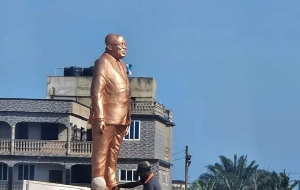The Precious Minerals Marketing Company (PMMC) has described as “totally bogus” and of “no effect” the Ghana Standard Authority’s (GSA) move to assay, value and certify refined gold in Ghana for the international bullion market.
Dr. Kwadjo Opare-Hammond, Managing Director of the PMMC, in an interview with the B&FT stressed that the Ghana Standards Authority has no mandate when it comes to dealing with the minerals sector – and this has been made very clear to them on several occasions.
“This issue came up sometime last year and it was settled by the Chief of Staff and the Deputy Attorney General; they [GSA] were told that the mandate, when it comes to precious minerals, is that of the PMMC and therefore they should stay away.
“We thought they had understood it, but they didn’t and still went ahead to undertake certain actions and the case got to the Economic Management Team (EMT), chaired by Vice-President Dr. Mahamudu Bawumia. And the general consensus was that the mandate to work on precious minerals, which includes to assay, grade, value, hallmark gold – raw or refined, is that of PMMC,” he said.
According to the Precious Minerals Marketing Corporation Law, 1989, PNDCL 219 – the law establishing the PMMC, the institution is tasked with grading, assaying, valuing and processing minerals… and to do all such things as are incidental or conducive to the attainment of its objects and functions.
“We are very surprised at what happened. It is unfortunate that the GSA did what it did with Gold Coast Refinery, because it smacks of disrespect for the Presidency. This is an issue that was settled at the EMT and even the Chief of Staff has come in,” Dr. Opare-Hammond said.
The GSA, on Tuesday, unveilled the first hallmarked gold bar produced and processed in the country by Gold Coast Refinery – a local refinery business. Ghana’s certification includes the mark of conformity of the Ghana Standard Authority; the fineness number – which corresponds to the given carats of the refined gold; and assaying and hallmarking centre mark.
Professor Alex Dodoo, Director General at the GSA, expressed delight at the authority’s contribution to the national economy by certifying purified gold in the country.
He explained that certification of any product, including precious metals like gold, is an established conformity assessment activity that provides confidence to customers, regulators, industry and other interested parties – to the effect that the product conforms with specified requirements, including product performance, safety, interoperability, and sustainability.
“Globally, the certification and hallmarking of gold is undertaken by national standards bodies, the leading agencies in developing countries,” he said, adding that the GSA has developed and adopted over 10 national and international standards for gold, precious minerals, and jewelry.
“We have also secured a world-class gold assay laboratory, equipped with state-of-the-art equipment comprising an X-ray Fluorescence Machine and all the requirements for fire assay analysis,” he said.
But Dr. Opare-Hammond argued that the hallmarking of gold cannot be undertaken by a local standards authority, and comes with a process that requires collaboration with several key state actors such as the Bank of Ghana and some ministries.
“When we want to do the hallmarking of gold, the PMMC – which has the mandate – has to collaborate with our ministry and the Bank of Ghana. Then we will define the hallmark and register it with the World Gold Council.
“For Ghana’s gold to be accepted by international gold dealers and the bullion market, we have to go through the LBMA – an institution that sets standards from the purity, form and provenance of the bars [gold] to the way in which they are traded – certification. Without the LBMA certification, no bar of gold will be accepted in the international market.
“Currently, none of the gold taken abroad has an LBMA certification. We are now taking steps to acquire LBMA certification. To enhance our attainment of the LBMA certification, we have brought in Baird & Co, an LBMA-certified gold refiner and assayer based in London,” he said.
Dr. Opare-Hammond added that Baird & Co is in with the right equipment and technical expertise to assay the gold: so that “all gold that leaves the shores of Ghana will be LBMA-certified”. He assured that after a number of years the PMMC will receive its own LBMA certification, and can then issue its own hallmarked gold.
He noted that the PMMC, in collaboration with the LBMA, is currently building its own internationally-recognised state-of-the-art gold refinery that will have the capacity to process almost 600 kilogrammes of gold per day.
“PMMC is the one mandated to deal in gold, whether it is in a raw or refined form. The GSA does not have any mandate, and therefore the whole activity that took place is exposing Ghana to public ridicule.”
Business News of Thursday, 29 November 2018
Source: thebftonline.com
















